Comprehensive Business Environment Analysis: Iceland Supermarket
VerifiedAdded on 2020/01/28
|16
|5963
|382
Report
AI Summary
This report provides a comprehensive analysis of the business environment, focusing on Iceland Supermarket. It begins with an introduction to the impact of the business environment on organizational performance, emphasizing both internal and external factors. The report then delves into the purposes of different organizations, comparing Iceland Supermarket, KFC, Transport for London, and Cancer Research. It examines how businesses meet stakeholder objectives, including customers, employees, and suppliers, and discusses the responsibilities and strategies employed by Iceland Supermarket. The analysis extends to different economic systems, including command, free market, and mixed economies, and assesses the impact of fiscal and monetary policies, competition policies, and market structures on business operations. Furthermore, the report explores the influence of market forces, business and cultural environments, international trade, and global factors on Iceland Supermarket. The impact of European Union policies is also considered. The report concludes by summarizing the key findings and providing references to support the analysis.
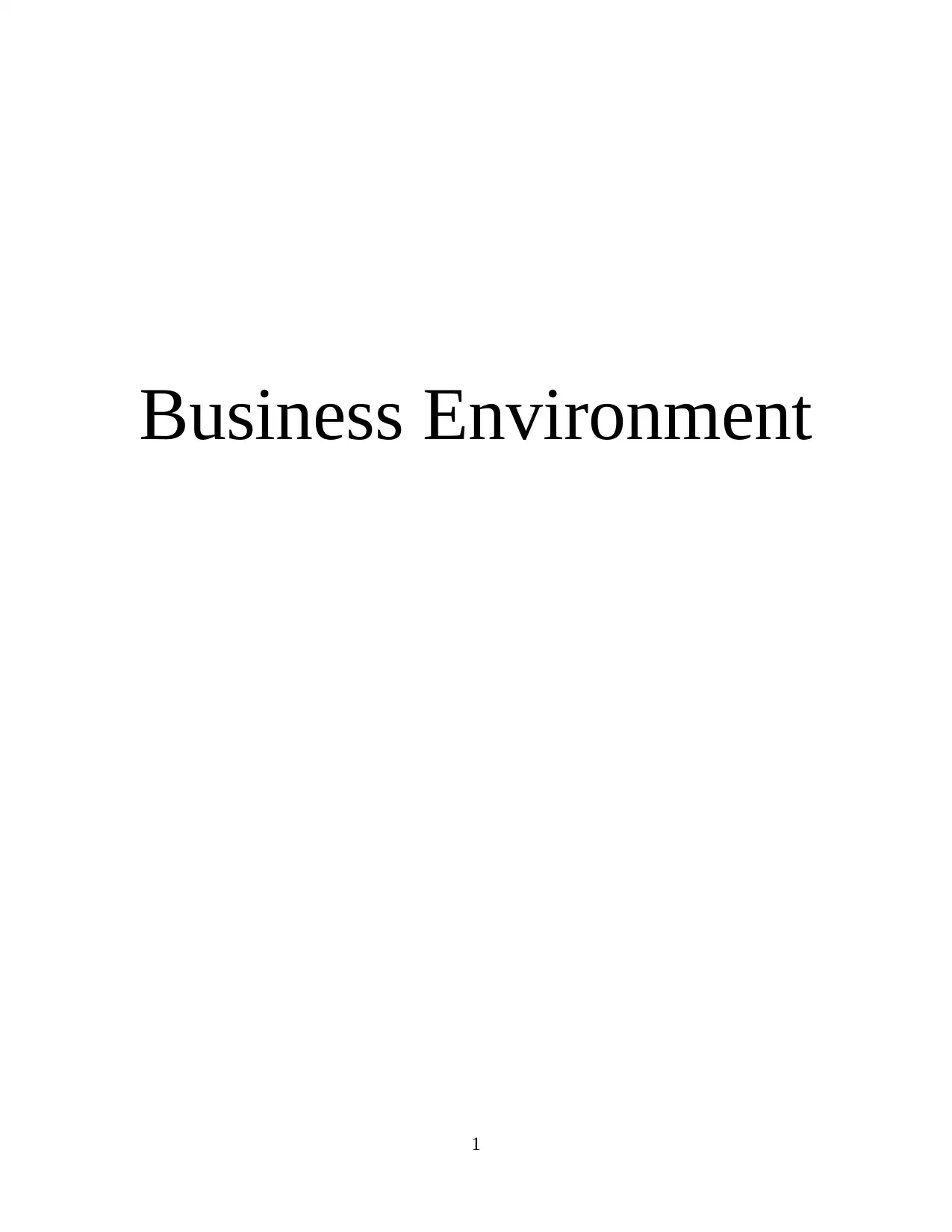
Business Environment
1
1
Paraphrase This Document
Need a fresh take? Get an instant paraphrase of this document with our AI Paraphraser
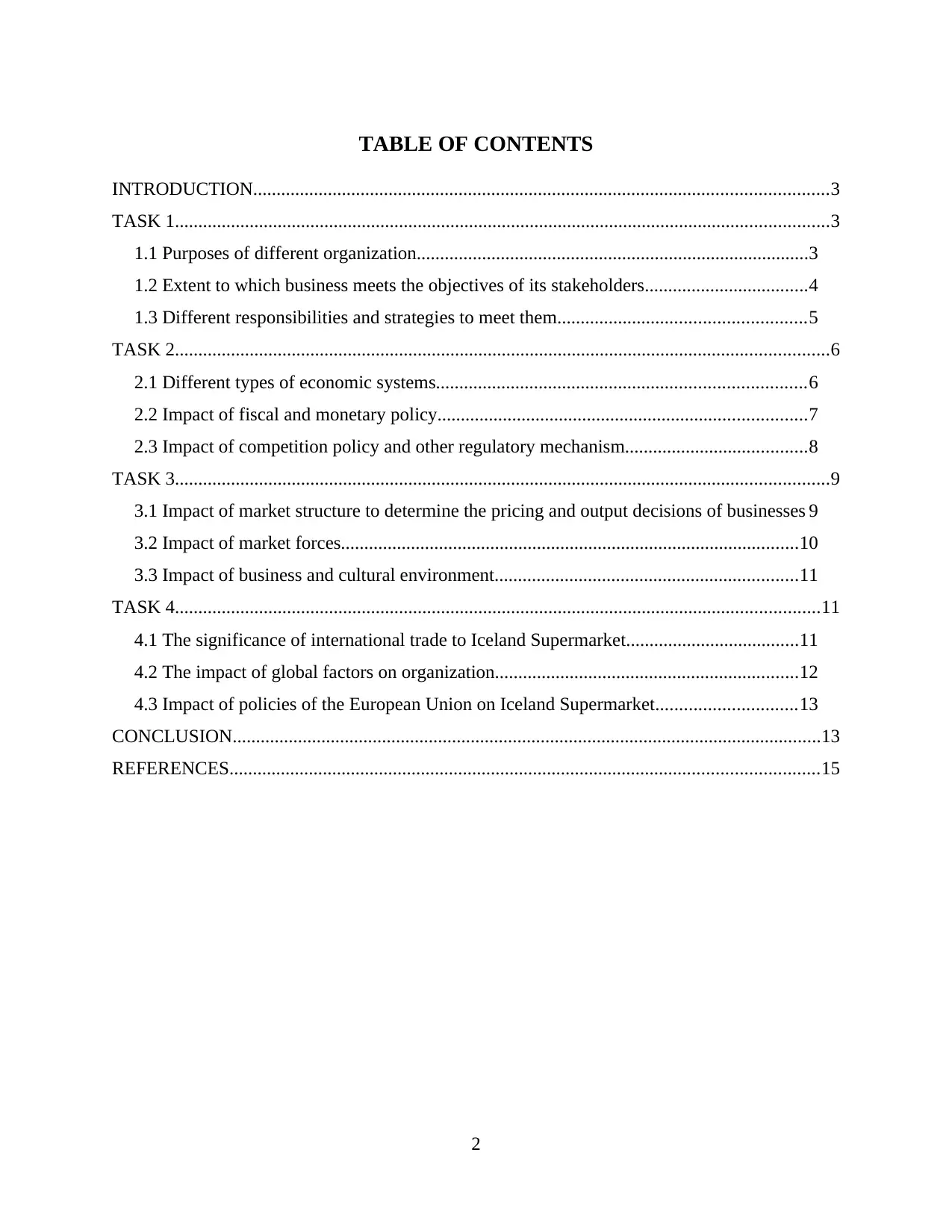
TABLE OF CONTENTS
INTRODUCTION...........................................................................................................................3
TASK 1............................................................................................................................................3
1.1 Purposes of different organization....................................................................................3
1.2 Extent to which business meets the objectives of its stakeholders...................................4
1.3 Different responsibilities and strategies to meet them.....................................................5
TASK 2............................................................................................................................................6
2.1 Different types of economic systems...............................................................................6
2.2 Impact of fiscal and monetary policy...............................................................................7
2.3 Impact of competition policy and other regulatory mechanism.......................................8
TASK 3............................................................................................................................................9
3.1 Impact of market structure to determine the pricing and output decisions of businesses 9
3.2 Impact of market forces..................................................................................................10
3.3 Impact of business and cultural environment.................................................................11
TASK 4..........................................................................................................................................11
4.1 The significance of international trade to Iceland Supermarket.....................................11
4.2 The impact of global factors on organization.................................................................12
4.3 Impact of policies of the European Union on Iceland Supermarket..............................13
CONCLUSION..............................................................................................................................13
REFERENCES..............................................................................................................................15
2
INTRODUCTION...........................................................................................................................3
TASK 1............................................................................................................................................3
1.1 Purposes of different organization....................................................................................3
1.2 Extent to which business meets the objectives of its stakeholders...................................4
1.3 Different responsibilities and strategies to meet them.....................................................5
TASK 2............................................................................................................................................6
2.1 Different types of economic systems...............................................................................6
2.2 Impact of fiscal and monetary policy...............................................................................7
2.3 Impact of competition policy and other regulatory mechanism.......................................8
TASK 3............................................................................................................................................9
3.1 Impact of market structure to determine the pricing and output decisions of businesses 9
3.2 Impact of market forces..................................................................................................10
3.3 Impact of business and cultural environment.................................................................11
TASK 4..........................................................................................................................................11
4.1 The significance of international trade to Iceland Supermarket.....................................11
4.2 The impact of global factors on organization.................................................................12
4.3 Impact of policies of the European Union on Iceland Supermarket..............................13
CONCLUSION..............................................................................................................................13
REFERENCES..............................................................................................................................15
2
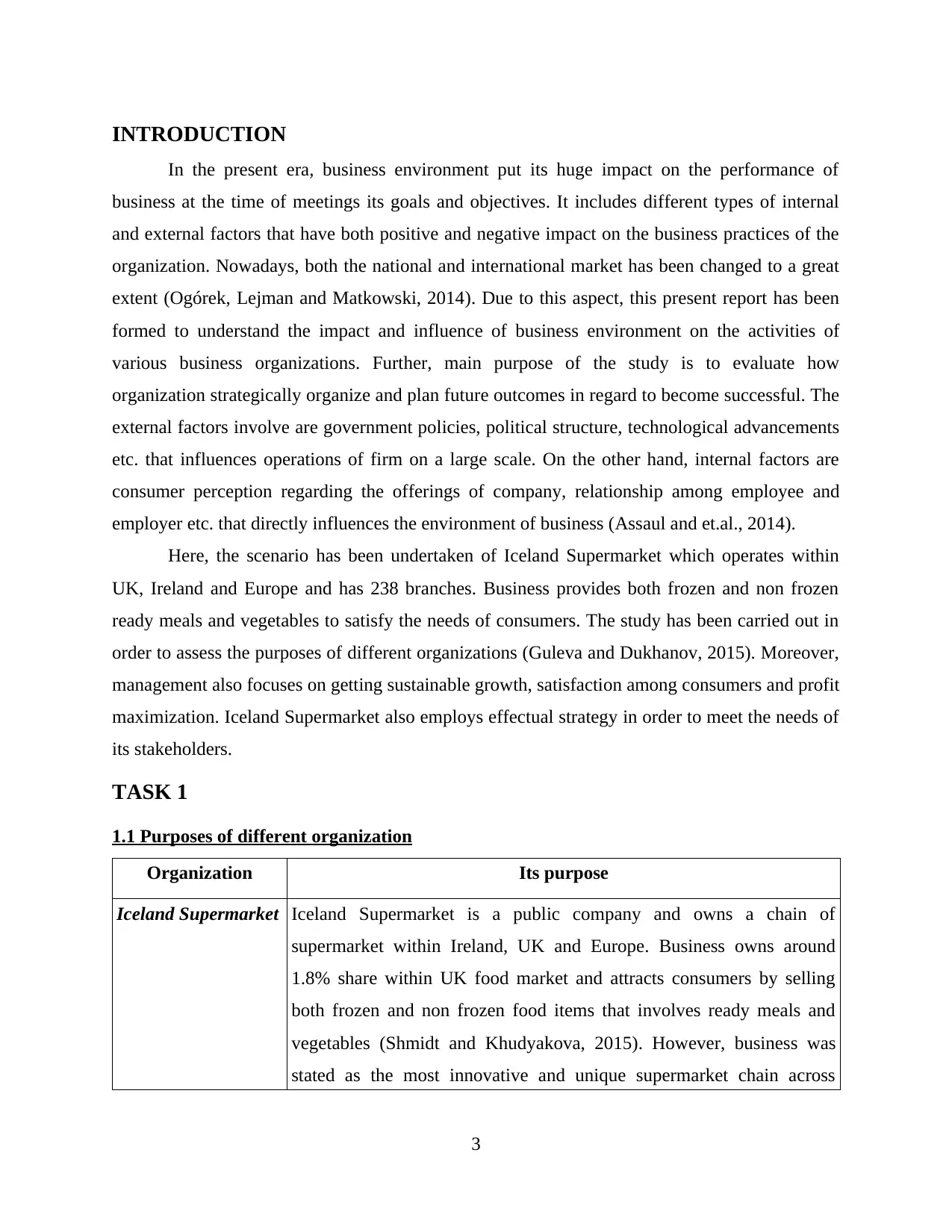
INTRODUCTION
In the present era, business environment put its huge impact on the performance of
business at the time of meetings its goals and objectives. It includes different types of internal
and external factors that have both positive and negative impact on the business practices of the
organization. Nowadays, both the national and international market has been changed to a great
extent (Ogórek, Lejman and Matkowski, 2014). Due to this aspect, this present report has been
formed to understand the impact and influence of business environment on the activities of
various business organizations. Further, main purpose of the study is to evaluate how
organization strategically organize and plan future outcomes in regard to become successful. The
external factors involve are government policies, political structure, technological advancements
etc. that influences operations of firm on a large scale. On the other hand, internal factors are
consumer perception regarding the offerings of company, relationship among employee and
employer etc. that directly influences the environment of business (Assaul and et.al., 2014).
Here, the scenario has been undertaken of Iceland Supermarket which operates within
UK, Ireland and Europe and has 238 branches. Business provides both frozen and non frozen
ready meals and vegetables to satisfy the needs of consumers. The study has been carried out in
order to assess the purposes of different organizations (Guleva and Dukhanov, 2015). Moreover,
management also focuses on getting sustainable growth, satisfaction among consumers and profit
maximization. Iceland Supermarket also employs effectual strategy in order to meet the needs of
its stakeholders.
TASK 1
1.1 Purposes of different organization
Organization Its purpose
Iceland Supermarket Iceland Supermarket is a public company and owns a chain of
supermarket within Ireland, UK and Europe. Business owns around
1.8% share within UK food market and attracts consumers by selling
both frozen and non frozen food items that involves ready meals and
vegetables (Shmidt and Khudyakova, 2015). However, business was
stated as the most innovative and unique supermarket chain across
3
In the present era, business environment put its huge impact on the performance of
business at the time of meetings its goals and objectives. It includes different types of internal
and external factors that have both positive and negative impact on the business practices of the
organization. Nowadays, both the national and international market has been changed to a great
extent (Ogórek, Lejman and Matkowski, 2014). Due to this aspect, this present report has been
formed to understand the impact and influence of business environment on the activities of
various business organizations. Further, main purpose of the study is to evaluate how
organization strategically organize and plan future outcomes in regard to become successful. The
external factors involve are government policies, political structure, technological advancements
etc. that influences operations of firm on a large scale. On the other hand, internal factors are
consumer perception regarding the offerings of company, relationship among employee and
employer etc. that directly influences the environment of business (Assaul and et.al., 2014).
Here, the scenario has been undertaken of Iceland Supermarket which operates within
UK, Ireland and Europe and has 238 branches. Business provides both frozen and non frozen
ready meals and vegetables to satisfy the needs of consumers. The study has been carried out in
order to assess the purposes of different organizations (Guleva and Dukhanov, 2015). Moreover,
management also focuses on getting sustainable growth, satisfaction among consumers and profit
maximization. Iceland Supermarket also employs effectual strategy in order to meet the needs of
its stakeholders.
TASK 1
1.1 Purposes of different organization
Organization Its purpose
Iceland Supermarket Iceland Supermarket is a public company and owns a chain of
supermarket within Ireland, UK and Europe. Business owns around
1.8% share within UK food market and attracts consumers by selling
both frozen and non frozen food items that involves ready meals and
vegetables (Shmidt and Khudyakova, 2015). However, business was
stated as the most innovative and unique supermarket chain across
3
⊘ This is a preview!⊘
Do you want full access?
Subscribe today to unlock all pages.

Trusted by 1+ million students worldwide
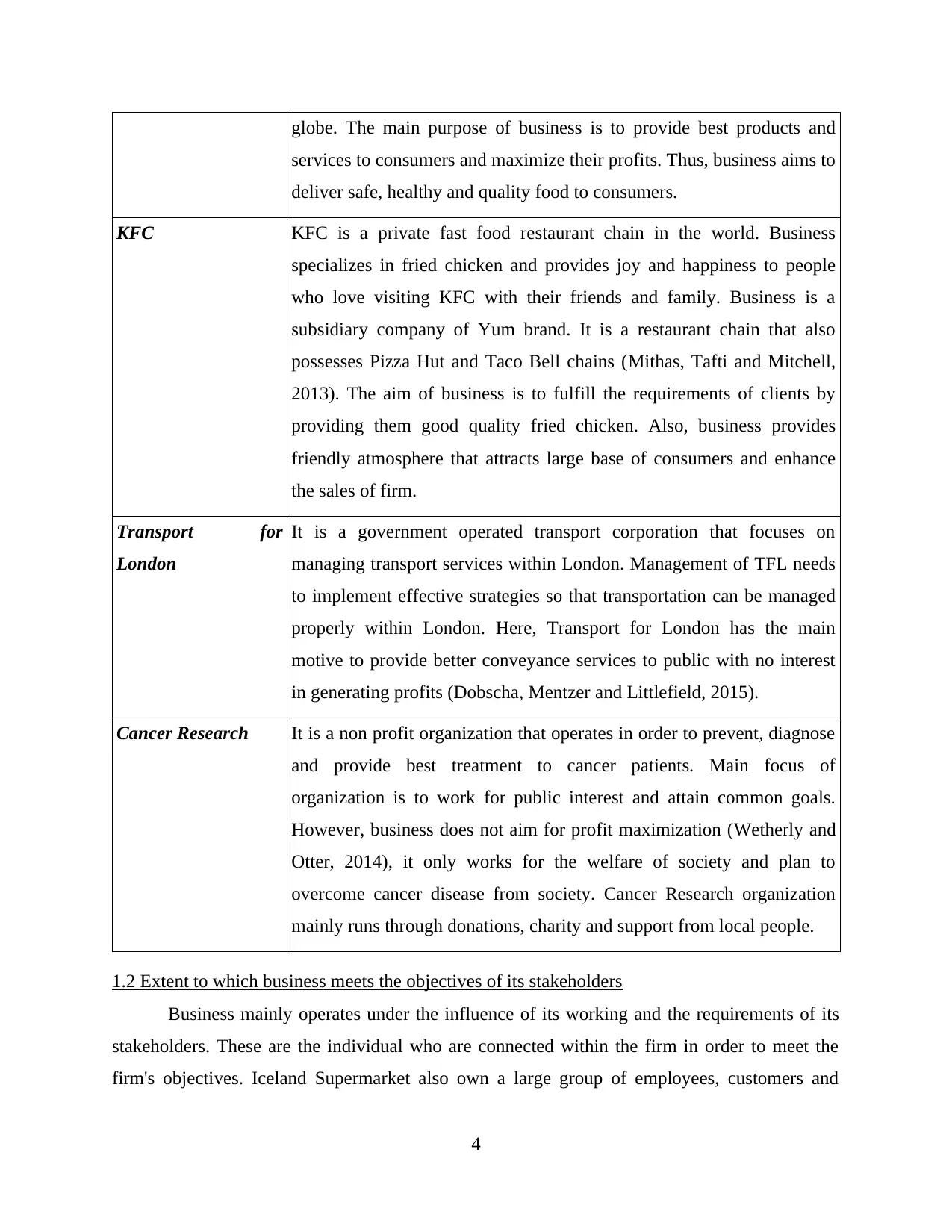
globe. The main purpose of business is to provide best products and
services to consumers and maximize their profits. Thus, business aims to
deliver safe, healthy and quality food to consumers.
KFC KFC is a private fast food restaurant chain in the world. Business
specializes in fried chicken and provides joy and happiness to people
who love visiting KFC with their friends and family. Business is a
subsidiary company of Yum brand. It is a restaurant chain that also
possesses Pizza Hut and Taco Bell chains (Mithas, Tafti and Mitchell,
2013). The aim of business is to fulfill the requirements of clients by
providing them good quality fried chicken. Also, business provides
friendly atmosphere that attracts large base of consumers and enhance
the sales of firm.
Transport for
London
It is a government operated transport corporation that focuses on
managing transport services within London. Management of TFL needs
to implement effective strategies so that transportation can be managed
properly within London. Here, Transport for London has the main
motive to provide better conveyance services to public with no interest
in generating profits (Dobscha, Mentzer and Littlefield, 2015).
Cancer Research It is a non profit organization that operates in order to prevent, diagnose
and provide best treatment to cancer patients. Main focus of
organization is to work for public interest and attain common goals.
However, business does not aim for profit maximization (Wetherly and
Otter, 2014), it only works for the welfare of society and plan to
overcome cancer disease from society. Cancer Research organization
mainly runs through donations, charity and support from local people.
1.2 Extent to which business meets the objectives of its stakeholders
Business mainly operates under the influence of its working and the requirements of its
stakeholders. These are the individual who are connected within the firm in order to meet the
firm's objectives. Iceland Supermarket also own a large group of employees, customers and
4
services to consumers and maximize their profits. Thus, business aims to
deliver safe, healthy and quality food to consumers.
KFC KFC is a private fast food restaurant chain in the world. Business
specializes in fried chicken and provides joy and happiness to people
who love visiting KFC with their friends and family. Business is a
subsidiary company of Yum brand. It is a restaurant chain that also
possesses Pizza Hut and Taco Bell chains (Mithas, Tafti and Mitchell,
2013). The aim of business is to fulfill the requirements of clients by
providing them good quality fried chicken. Also, business provides
friendly atmosphere that attracts large base of consumers and enhance
the sales of firm.
Transport for
London
It is a government operated transport corporation that focuses on
managing transport services within London. Management of TFL needs
to implement effective strategies so that transportation can be managed
properly within London. Here, Transport for London has the main
motive to provide better conveyance services to public with no interest
in generating profits (Dobscha, Mentzer and Littlefield, 2015).
Cancer Research It is a non profit organization that operates in order to prevent, diagnose
and provide best treatment to cancer patients. Main focus of
organization is to work for public interest and attain common goals.
However, business does not aim for profit maximization (Wetherly and
Otter, 2014), it only works for the welfare of society and plan to
overcome cancer disease from society. Cancer Research organization
mainly runs through donations, charity and support from local people.
1.2 Extent to which business meets the objectives of its stakeholders
Business mainly operates under the influence of its working and the requirements of its
stakeholders. These are the individual who are connected within the firm in order to meet the
firm's objectives. Iceland Supermarket also own a large group of employees, customers and
4
Paraphrase This Document
Need a fresh take? Get an instant paraphrase of this document with our AI Paraphraser
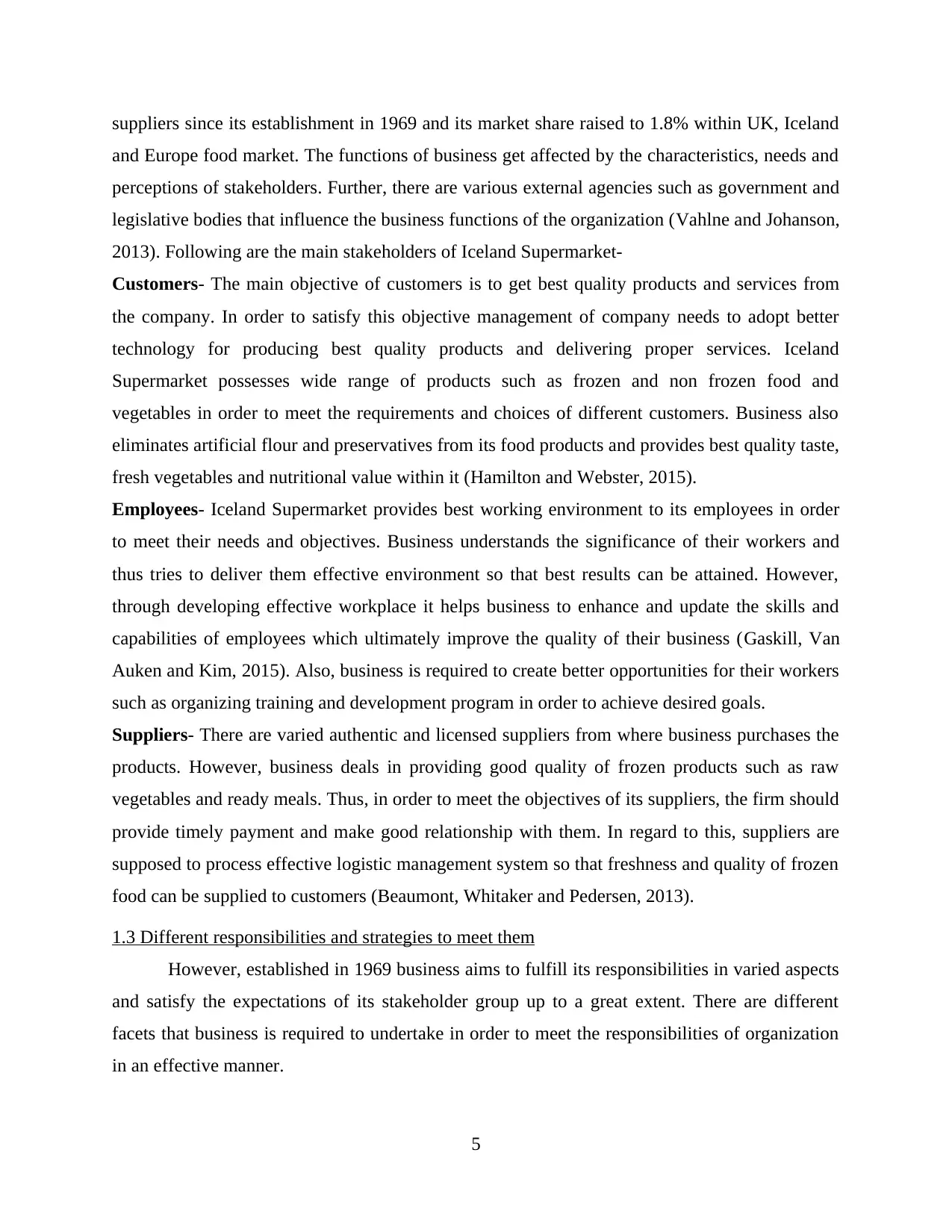
suppliers since its establishment in 1969 and its market share raised to 1.8% within UK, Iceland
and Europe food market. The functions of business get affected by the characteristics, needs and
perceptions of stakeholders. Further, there are various external agencies such as government and
legislative bodies that influence the business functions of the organization (Vahlne and Johanson,
2013). Following are the main stakeholders of Iceland Supermarket-
Customers- The main objective of customers is to get best quality products and services from
the company. In order to satisfy this objective management of company needs to adopt better
technology for producing best quality products and delivering proper services. Iceland
Supermarket possesses wide range of products such as frozen and non frozen food and
vegetables in order to meet the requirements and choices of different customers. Business also
eliminates artificial flour and preservatives from its food products and provides best quality taste,
fresh vegetables and nutritional value within it (Hamilton and Webster, 2015).
Employees- Iceland Supermarket provides best working environment to its employees in order
to meet their needs and objectives. Business understands the significance of their workers and
thus tries to deliver them effective environment so that best results can be attained. However,
through developing effective workplace it helps business to enhance and update the skills and
capabilities of employees which ultimately improve the quality of their business (Gaskill, Van
Auken and Kim, 2015). Also, business is required to create better opportunities for their workers
such as organizing training and development program in order to achieve desired goals.
Suppliers- There are varied authentic and licensed suppliers from where business purchases the
products. However, business deals in providing good quality of frozen products such as raw
vegetables and ready meals. Thus, in order to meet the objectives of its suppliers, the firm should
provide timely payment and make good relationship with them. In regard to this, suppliers are
supposed to process effective logistic management system so that freshness and quality of frozen
food can be supplied to customers (Beaumont, Whitaker and Pedersen, 2013).
1.3 Different responsibilities and strategies to meet them
However, established in 1969 business aims to fulfill its responsibilities in varied aspects
and satisfy the expectations of its stakeholder group up to a great extent. There are different
facets that business is required to undertake in order to meet the responsibilities of organization
in an effective manner.
5
and Europe food market. The functions of business get affected by the characteristics, needs and
perceptions of stakeholders. Further, there are various external agencies such as government and
legislative bodies that influence the business functions of the organization (Vahlne and Johanson,
2013). Following are the main stakeholders of Iceland Supermarket-
Customers- The main objective of customers is to get best quality products and services from
the company. In order to satisfy this objective management of company needs to adopt better
technology for producing best quality products and delivering proper services. Iceland
Supermarket possesses wide range of products such as frozen and non frozen food and
vegetables in order to meet the requirements and choices of different customers. Business also
eliminates artificial flour and preservatives from its food products and provides best quality taste,
fresh vegetables and nutritional value within it (Hamilton and Webster, 2015).
Employees- Iceland Supermarket provides best working environment to its employees in order
to meet their needs and objectives. Business understands the significance of their workers and
thus tries to deliver them effective environment so that best results can be attained. However,
through developing effective workplace it helps business to enhance and update the skills and
capabilities of employees which ultimately improve the quality of their business (Gaskill, Van
Auken and Kim, 2015). Also, business is required to create better opportunities for their workers
such as organizing training and development program in order to achieve desired goals.
Suppliers- There are varied authentic and licensed suppliers from where business purchases the
products. However, business deals in providing good quality of frozen products such as raw
vegetables and ready meals. Thus, in order to meet the objectives of its suppliers, the firm should
provide timely payment and make good relationship with them. In regard to this, suppliers are
supposed to process effective logistic management system so that freshness and quality of frozen
food can be supplied to customers (Beaumont, Whitaker and Pedersen, 2013).
1.3 Different responsibilities and strategies to meet them
However, established in 1969 business aims to fulfill its responsibilities in varied aspects
and satisfy the expectations of its stakeholder group up to a great extent. There are different
facets that business is required to undertake in order to meet the responsibilities of organization
in an effective manner.
5
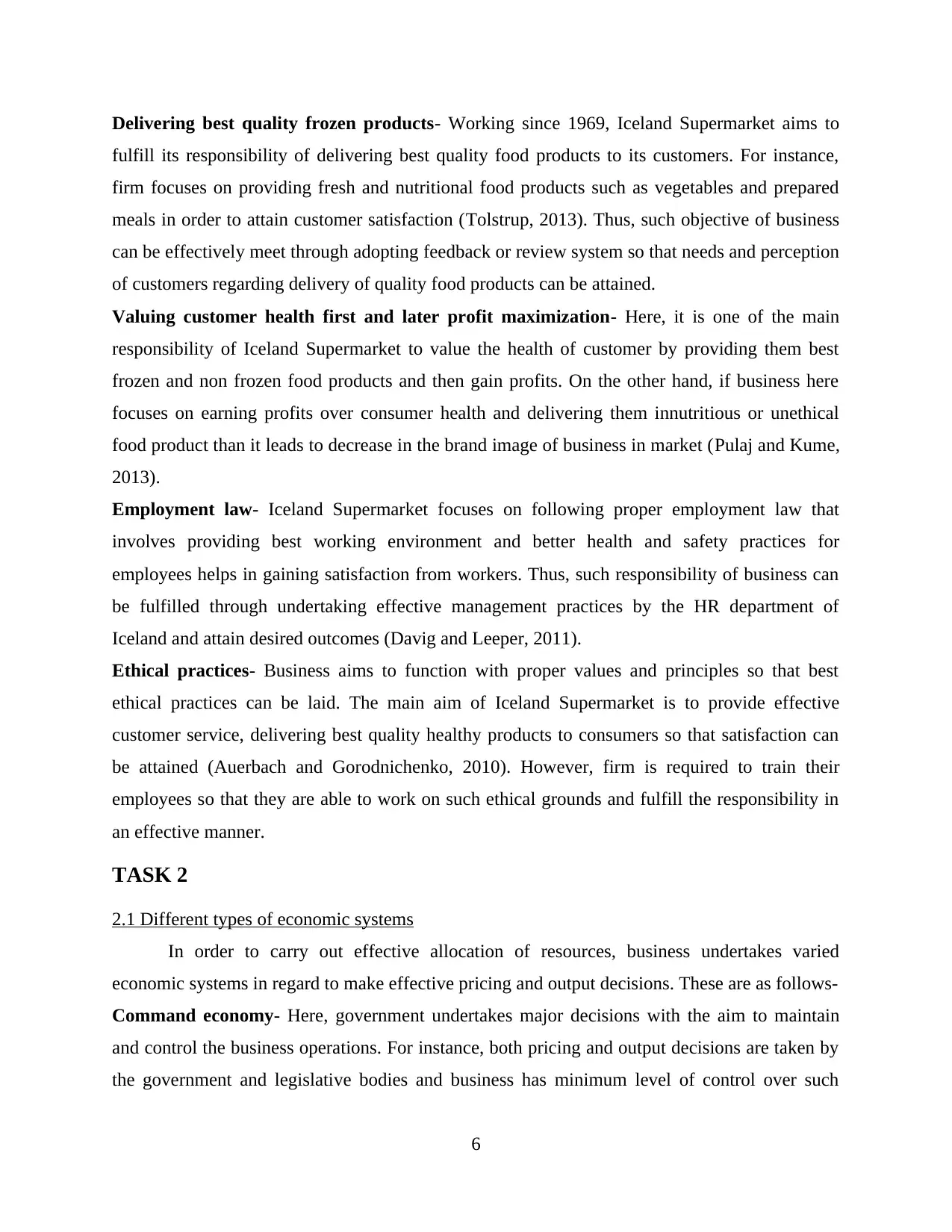
Delivering best quality frozen products- Working since 1969, Iceland Supermarket aims to
fulfill its responsibility of delivering best quality food products to its customers. For instance,
firm focuses on providing fresh and nutritional food products such as vegetables and prepared
meals in order to attain customer satisfaction (Tolstrup, 2013). Thus, such objective of business
can be effectively meet through adopting feedback or review system so that needs and perception
of customers regarding delivery of quality food products can be attained.
Valuing customer health first and later profit maximization- Here, it is one of the main
responsibility of Iceland Supermarket to value the health of customer by providing them best
frozen and non frozen food products and then gain profits. On the other hand, if business here
focuses on earning profits over consumer health and delivering them innutritious or unethical
food product than it leads to decrease in the brand image of business in market (Pulaj and Kume,
2013).
Employment law- Iceland Supermarket focuses on following proper employment law that
involves providing best working environment and better health and safety practices for
employees helps in gaining satisfaction from workers. Thus, such responsibility of business can
be fulfilled through undertaking effective management practices by the HR department of
Iceland and attain desired outcomes (Davig and Leeper, 2011).
Ethical practices- Business aims to function with proper values and principles so that best
ethical practices can be laid. The main aim of Iceland Supermarket is to provide effective
customer service, delivering best quality healthy products to consumers so that satisfaction can
be attained (Auerbach and Gorodnichenko, 2010). However, firm is required to train their
employees so that they are able to work on such ethical grounds and fulfill the responsibility in
an effective manner.
TASK 2
2.1 Different types of economic systems
In order to carry out effective allocation of resources, business undertakes varied
economic systems in regard to make effective pricing and output decisions. These are as follows-
Command economy- Here, government undertakes major decisions with the aim to maintain
and control the business operations. For instance, both pricing and output decisions are taken by
the government and legislative bodies and business has minimum level of control over such
6
fulfill its responsibility of delivering best quality food products to its customers. For instance,
firm focuses on providing fresh and nutritional food products such as vegetables and prepared
meals in order to attain customer satisfaction (Tolstrup, 2013). Thus, such objective of business
can be effectively meet through adopting feedback or review system so that needs and perception
of customers regarding delivery of quality food products can be attained.
Valuing customer health first and later profit maximization- Here, it is one of the main
responsibility of Iceland Supermarket to value the health of customer by providing them best
frozen and non frozen food products and then gain profits. On the other hand, if business here
focuses on earning profits over consumer health and delivering them innutritious or unethical
food product than it leads to decrease in the brand image of business in market (Pulaj and Kume,
2013).
Employment law- Iceland Supermarket focuses on following proper employment law that
involves providing best working environment and better health and safety practices for
employees helps in gaining satisfaction from workers. Thus, such responsibility of business can
be fulfilled through undertaking effective management practices by the HR department of
Iceland and attain desired outcomes (Davig and Leeper, 2011).
Ethical practices- Business aims to function with proper values and principles so that best
ethical practices can be laid. The main aim of Iceland Supermarket is to provide effective
customer service, delivering best quality healthy products to consumers so that satisfaction can
be attained (Auerbach and Gorodnichenko, 2010). However, firm is required to train their
employees so that they are able to work on such ethical grounds and fulfill the responsibility in
an effective manner.
TASK 2
2.1 Different types of economic systems
In order to carry out effective allocation of resources, business undertakes varied
economic systems in regard to make effective pricing and output decisions. These are as follows-
Command economy- Here, government undertakes major decisions with the aim to maintain
and control the business operations. For instance, both pricing and output decisions are taken by
the government and legislative bodies and business has minimum level of control over such
6
⊘ This is a preview!⊘
Do you want full access?
Subscribe today to unlock all pages.

Trusted by 1+ million students worldwide
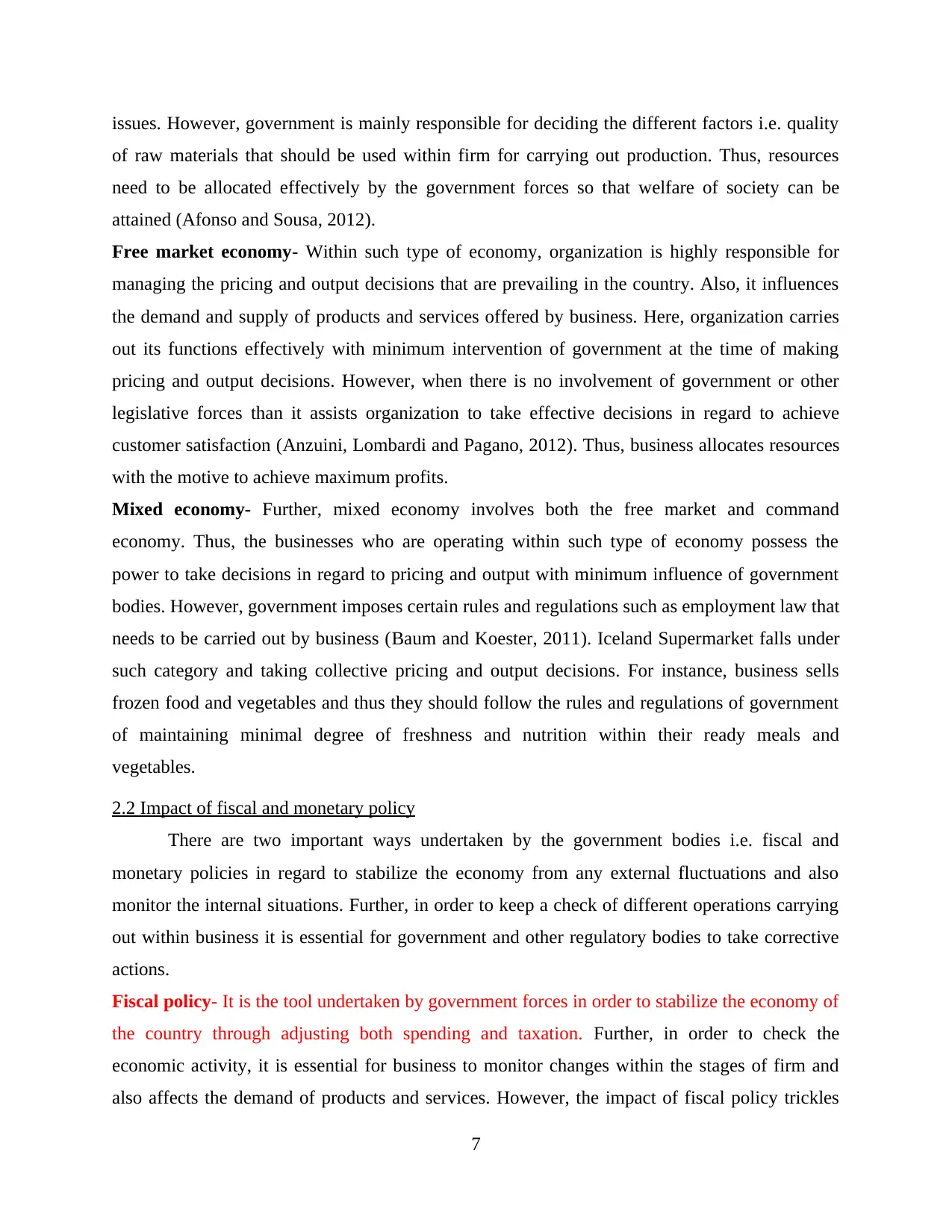
issues. However, government is mainly responsible for deciding the different factors i.e. quality
of raw materials that should be used within firm for carrying out production. Thus, resources
need to be allocated effectively by the government forces so that welfare of society can be
attained (Afonso and Sousa, 2012).
Free market economy- Within such type of economy, organization is highly responsible for
managing the pricing and output decisions that are prevailing in the country. Also, it influences
the demand and supply of products and services offered by business. Here, organization carries
out its functions effectively with minimum intervention of government at the time of making
pricing and output decisions. However, when there is no involvement of government or other
legislative forces than it assists organization to take effective decisions in regard to achieve
customer satisfaction (Anzuini, Lombardi and Pagano, 2012). Thus, business allocates resources
with the motive to achieve maximum profits.
Mixed economy- Further, mixed economy involves both the free market and command
economy. Thus, the businesses who are operating within such type of economy possess the
power to take decisions in regard to pricing and output with minimum influence of government
bodies. However, government imposes certain rules and regulations such as employment law that
needs to be carried out by business (Baum and Koester, 2011). Iceland Supermarket falls under
such category and taking collective pricing and output decisions. For instance, business sells
frozen food and vegetables and thus they should follow the rules and regulations of government
of maintaining minimal degree of freshness and nutrition within their ready meals and
vegetables.
2.2 Impact of fiscal and monetary policy
There are two important ways undertaken by the government bodies i.e. fiscal and
monetary policies in regard to stabilize the economy from any external fluctuations and also
monitor the internal situations. Further, in order to keep a check of different operations carrying
out within business it is essential for government and other regulatory bodies to take corrective
actions.
Fiscal policy- It is the tool undertaken by government forces in order to stabilize the economy of
the country through adjusting both spending and taxation. Further, in order to check the
economic activity, it is essential for business to monitor changes within the stages of firm and
also affects the demand of products and services. However, the impact of fiscal policy trickles
7
of raw materials that should be used within firm for carrying out production. Thus, resources
need to be allocated effectively by the government forces so that welfare of society can be
attained (Afonso and Sousa, 2012).
Free market economy- Within such type of economy, organization is highly responsible for
managing the pricing and output decisions that are prevailing in the country. Also, it influences
the demand and supply of products and services offered by business. Here, organization carries
out its functions effectively with minimum intervention of government at the time of making
pricing and output decisions. However, when there is no involvement of government or other
legislative forces than it assists organization to take effective decisions in regard to achieve
customer satisfaction (Anzuini, Lombardi and Pagano, 2012). Thus, business allocates resources
with the motive to achieve maximum profits.
Mixed economy- Further, mixed economy involves both the free market and command
economy. Thus, the businesses who are operating within such type of economy possess the
power to take decisions in regard to pricing and output with minimum influence of government
bodies. However, government imposes certain rules and regulations such as employment law that
needs to be carried out by business (Baum and Koester, 2011). Iceland Supermarket falls under
such category and taking collective pricing and output decisions. For instance, business sells
frozen food and vegetables and thus they should follow the rules and regulations of government
of maintaining minimal degree of freshness and nutrition within their ready meals and
vegetables.
2.2 Impact of fiscal and monetary policy
There are two important ways undertaken by the government bodies i.e. fiscal and
monetary policies in regard to stabilize the economy from any external fluctuations and also
monitor the internal situations. Further, in order to keep a check of different operations carrying
out within business it is essential for government and other regulatory bodies to take corrective
actions.
Fiscal policy- It is the tool undertaken by government forces in order to stabilize the economy of
the country through adjusting both spending and taxation. Further, in order to check the
economic activity, it is essential for business to monitor changes within the stages of firm and
also affects the demand of products and services. However, the impact of fiscal policy trickles
7
Paraphrase This Document
Need a fresh take? Get an instant paraphrase of this document with our AI Paraphraser
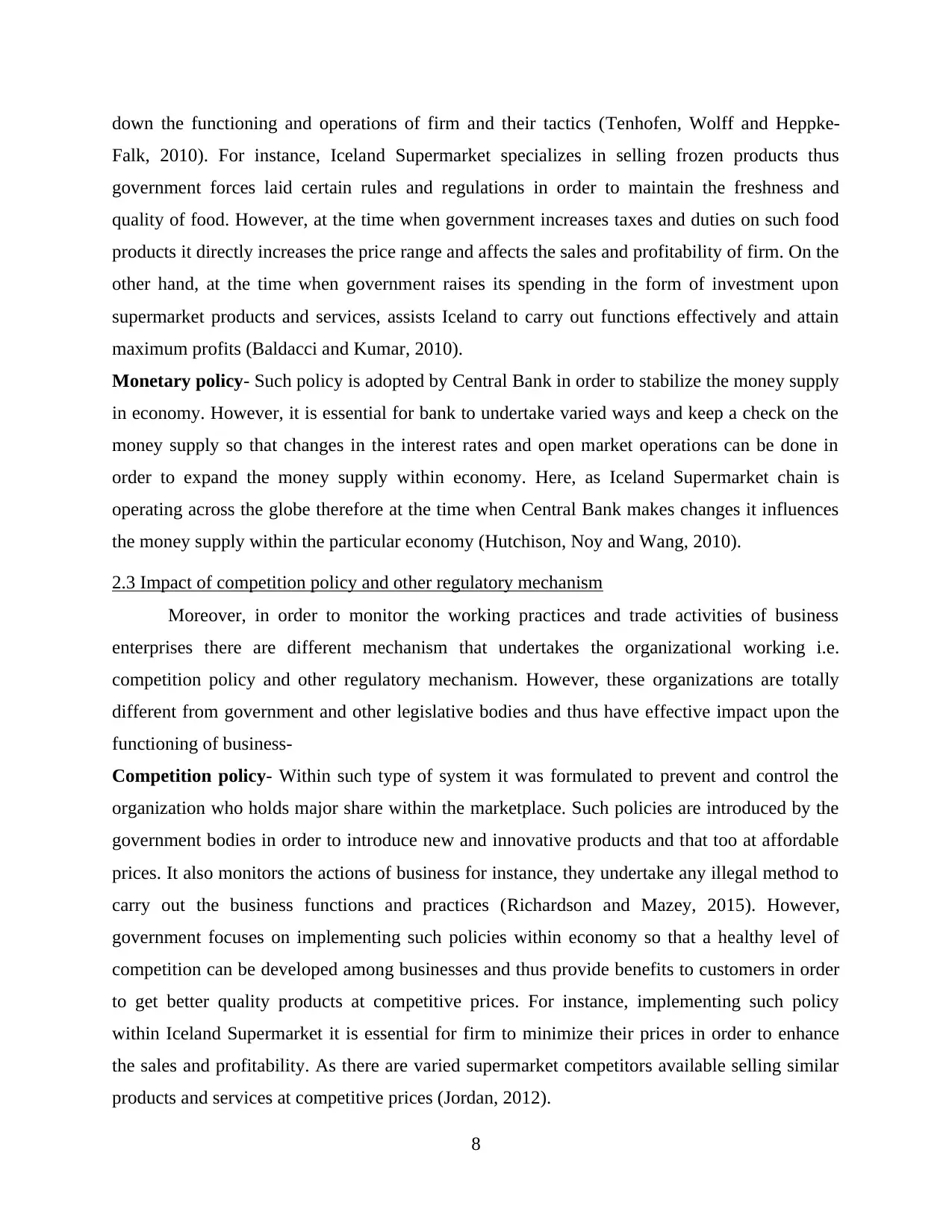
down the functioning and operations of firm and their tactics (Tenhofen, Wolff and Heppke-
Falk, 2010). For instance, Iceland Supermarket specializes in selling frozen products thus
government forces laid certain rules and regulations in order to maintain the freshness and
quality of food. However, at the time when government increases taxes and duties on such food
products it directly increases the price range and affects the sales and profitability of firm. On the
other hand, at the time when government raises its spending in the form of investment upon
supermarket products and services, assists Iceland to carry out functions effectively and attain
maximum profits (Baldacci and Kumar, 2010).
Monetary policy- Such policy is adopted by Central Bank in order to stabilize the money supply
in economy. However, it is essential for bank to undertake varied ways and keep a check on the
money supply so that changes in the interest rates and open market operations can be done in
order to expand the money supply within economy. Here, as Iceland Supermarket chain is
operating across the globe therefore at the time when Central Bank makes changes it influences
the money supply within the particular economy (Hutchison, Noy and Wang, 2010).
2.3 Impact of competition policy and other regulatory mechanism
Moreover, in order to monitor the working practices and trade activities of business
enterprises there are different mechanism that undertakes the organizational working i.e.
competition policy and other regulatory mechanism. However, these organizations are totally
different from government and other legislative bodies and thus have effective impact upon the
functioning of business-
Competition policy- Within such type of system it was formulated to prevent and control the
organization who holds major share within the marketplace. Such policies are introduced by the
government bodies in order to introduce new and innovative products and that too at affordable
prices. It also monitors the actions of business for instance, they undertake any illegal method to
carry out the business functions and practices (Richardson and Mazey, 2015). However,
government focuses on implementing such policies within economy so that a healthy level of
competition can be developed among businesses and thus provide benefits to customers in order
to get better quality products at competitive prices. For instance, implementing such policy
within Iceland Supermarket it is essential for firm to minimize their prices in order to enhance
the sales and profitability. As there are varied supermarket competitors available selling similar
products and services at competitive prices (Jordan, 2012).
8
Falk, 2010). For instance, Iceland Supermarket specializes in selling frozen products thus
government forces laid certain rules and regulations in order to maintain the freshness and
quality of food. However, at the time when government increases taxes and duties on such food
products it directly increases the price range and affects the sales and profitability of firm. On the
other hand, at the time when government raises its spending in the form of investment upon
supermarket products and services, assists Iceland to carry out functions effectively and attain
maximum profits (Baldacci and Kumar, 2010).
Monetary policy- Such policy is adopted by Central Bank in order to stabilize the money supply
in economy. However, it is essential for bank to undertake varied ways and keep a check on the
money supply so that changes in the interest rates and open market operations can be done in
order to expand the money supply within economy. Here, as Iceland Supermarket chain is
operating across the globe therefore at the time when Central Bank makes changes it influences
the money supply within the particular economy (Hutchison, Noy and Wang, 2010).
2.3 Impact of competition policy and other regulatory mechanism
Moreover, in order to monitor the working practices and trade activities of business
enterprises there are different mechanism that undertakes the organizational working i.e.
competition policy and other regulatory mechanism. However, these organizations are totally
different from government and other legislative bodies and thus have effective impact upon the
functioning of business-
Competition policy- Within such type of system it was formulated to prevent and control the
organization who holds major share within the marketplace. Such policies are introduced by the
government bodies in order to introduce new and innovative products and that too at affordable
prices. It also monitors the actions of business for instance, they undertake any illegal method to
carry out the business functions and practices (Richardson and Mazey, 2015). However,
government focuses on implementing such policies within economy so that a healthy level of
competition can be developed among businesses and thus provide benefits to customers in order
to get better quality products at competitive prices. For instance, implementing such policy
within Iceland Supermarket it is essential for firm to minimize their prices in order to enhance
the sales and profitability. As there are varied supermarket competitors available selling similar
products and services at competitive prices (Jordan, 2012).
8
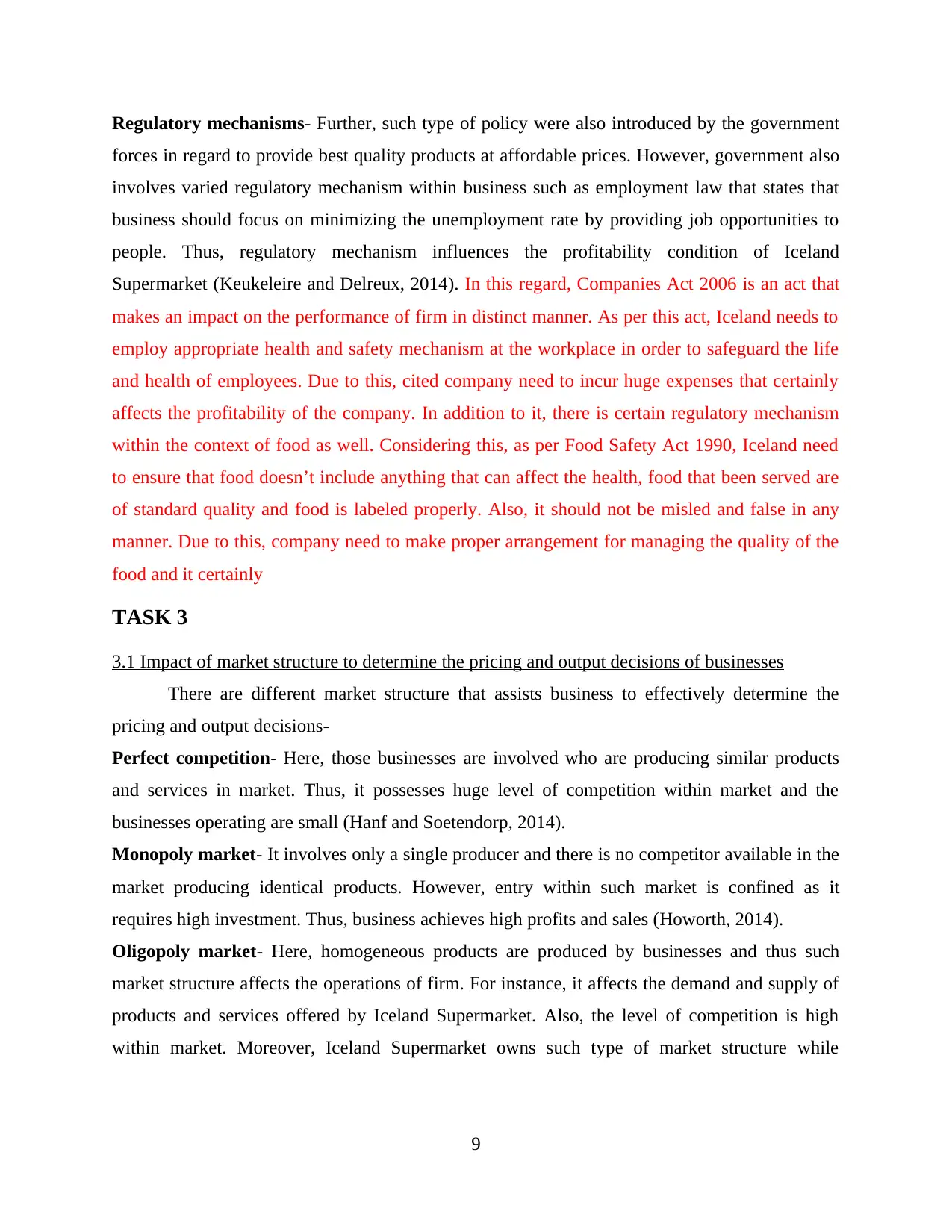
Regulatory mechanisms- Further, such type of policy were also introduced by the government
forces in regard to provide best quality products at affordable prices. However, government also
involves varied regulatory mechanism within business such as employment law that states that
business should focus on minimizing the unemployment rate by providing job opportunities to
people. Thus, regulatory mechanism influences the profitability condition of Iceland
Supermarket (Keukeleire and Delreux, 2014). In this regard, Companies Act 2006 is an act that
makes an impact on the performance of firm in distinct manner. As per this act, Iceland needs to
employ appropriate health and safety mechanism at the workplace in order to safeguard the life
and health of employees. Due to this, cited company need to incur huge expenses that certainly
affects the profitability of the company. In addition to it, there is certain regulatory mechanism
within the context of food as well. Considering this, as per Food Safety Act 1990, Iceland need
to ensure that food doesn’t include anything that can affect the health, food that been served are
of standard quality and food is labeled properly. Also, it should not be misled and false in any
manner. Due to this, company need to make proper arrangement for managing the quality of the
food and it certainly
TASK 3
3.1 Impact of market structure to determine the pricing and output decisions of businesses
There are different market structure that assists business to effectively determine the
pricing and output decisions-
Perfect competition- Here, those businesses are involved who are producing similar products
and services in market. Thus, it possesses huge level of competition within market and the
businesses operating are small (Hanf and Soetendorp, 2014).
Monopoly market- It involves only a single producer and there is no competitor available in the
market producing identical products. However, entry within such market is confined as it
requires high investment. Thus, business achieves high profits and sales (Howorth, 2014).
Oligopoly market- Here, homogeneous products are produced by businesses and thus such
market structure affects the operations of firm. For instance, it affects the demand and supply of
products and services offered by Iceland Supermarket. Also, the level of competition is high
within market. Moreover, Iceland Supermarket owns such type of market structure while
9
forces in regard to provide best quality products at affordable prices. However, government also
involves varied regulatory mechanism within business such as employment law that states that
business should focus on minimizing the unemployment rate by providing job opportunities to
people. Thus, regulatory mechanism influences the profitability condition of Iceland
Supermarket (Keukeleire and Delreux, 2014). In this regard, Companies Act 2006 is an act that
makes an impact on the performance of firm in distinct manner. As per this act, Iceland needs to
employ appropriate health and safety mechanism at the workplace in order to safeguard the life
and health of employees. Due to this, cited company need to incur huge expenses that certainly
affects the profitability of the company. In addition to it, there is certain regulatory mechanism
within the context of food as well. Considering this, as per Food Safety Act 1990, Iceland need
to ensure that food doesn’t include anything that can affect the health, food that been served are
of standard quality and food is labeled properly. Also, it should not be misled and false in any
manner. Due to this, company need to make proper arrangement for managing the quality of the
food and it certainly
TASK 3
3.1 Impact of market structure to determine the pricing and output decisions of businesses
There are different market structure that assists business to effectively determine the
pricing and output decisions-
Perfect competition- Here, those businesses are involved who are producing similar products
and services in market. Thus, it possesses huge level of competition within market and the
businesses operating are small (Hanf and Soetendorp, 2014).
Monopoly market- It involves only a single producer and there is no competitor available in the
market producing identical products. However, entry within such market is confined as it
requires high investment. Thus, business achieves high profits and sales (Howorth, 2014).
Oligopoly market- Here, homogeneous products are produced by businesses and thus such
market structure affects the operations of firm. For instance, it affects the demand and supply of
products and services offered by Iceland Supermarket. Also, the level of competition is high
within market. Moreover, Iceland Supermarket owns such type of market structure while
9
⊘ This is a preview!⊘
Do you want full access?
Subscribe today to unlock all pages.

Trusted by 1+ million students worldwide
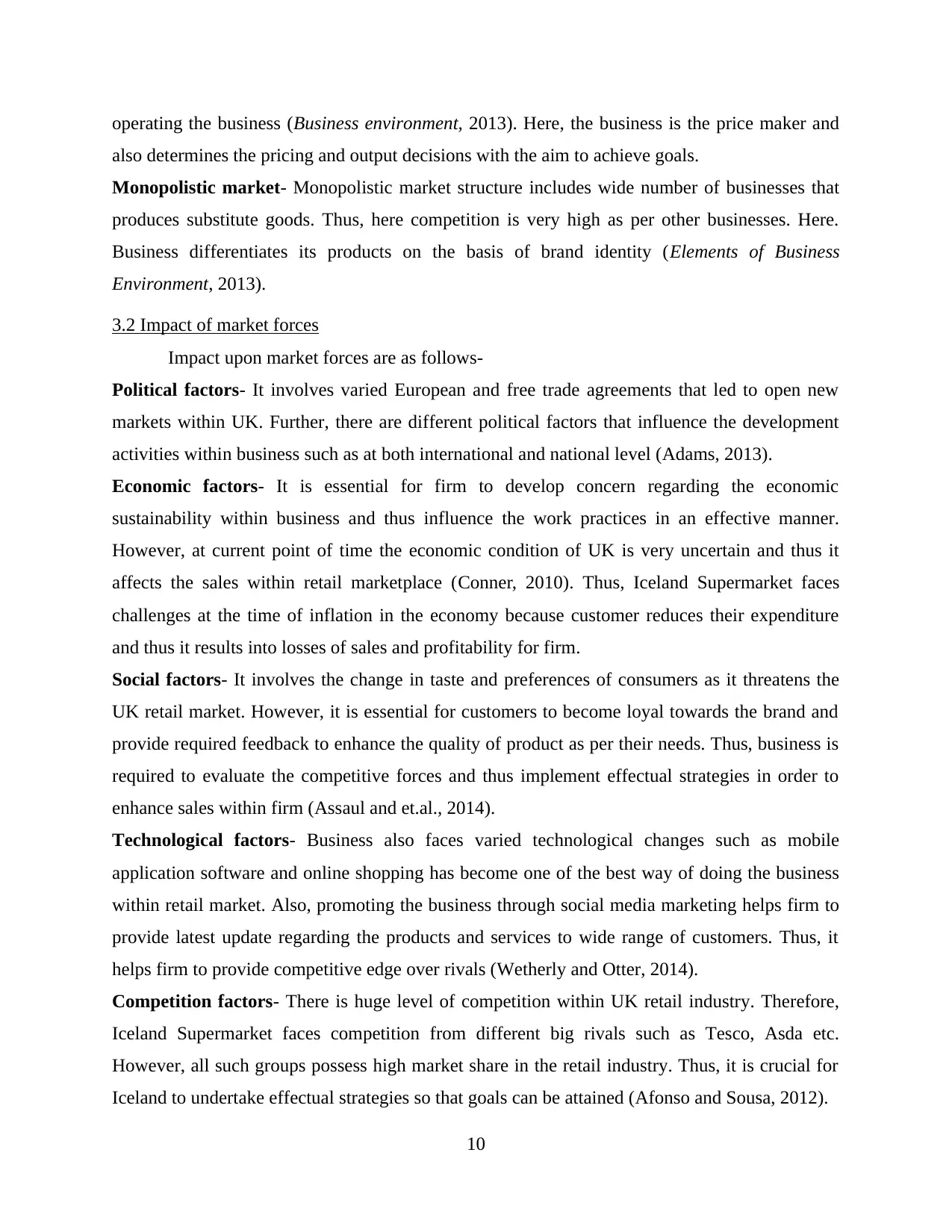
operating the business (Business environment, 2013). Here, the business is the price maker and
also determines the pricing and output decisions with the aim to achieve goals.
Monopolistic market- Monopolistic market structure includes wide number of businesses that
produces substitute goods. Thus, here competition is very high as per other businesses. Here.
Business differentiates its products on the basis of brand identity (Elements of Business
Environment, 2013).
3.2 Impact of market forces
Impact upon market forces are as follows-
Political factors- It involves varied European and free trade agreements that led to open new
markets within UK. Further, there are different political factors that influence the development
activities within business such as at both international and national level (Adams, 2013).
Economic factors- It is essential for firm to develop concern regarding the economic
sustainability within business and thus influence the work practices in an effective manner.
However, at current point of time the economic condition of UK is very uncertain and thus it
affects the sales within retail marketplace (Conner, 2010). Thus, Iceland Supermarket faces
challenges at the time of inflation in the economy because customer reduces their expenditure
and thus it results into losses of sales and profitability for firm.
Social factors- It involves the change in taste and preferences of consumers as it threatens the
UK retail market. However, it is essential for customers to become loyal towards the brand and
provide required feedback to enhance the quality of product as per their needs. Thus, business is
required to evaluate the competitive forces and thus implement effectual strategies in order to
enhance sales within firm (Assaul and et.al., 2014).
Technological factors- Business also faces varied technological changes such as mobile
application software and online shopping has become one of the best way of doing the business
within retail market. Also, promoting the business through social media marketing helps firm to
provide latest update regarding the products and services to wide range of customers. Thus, it
helps firm to provide competitive edge over rivals (Wetherly and Otter, 2014).
Competition factors- There is huge level of competition within UK retail industry. Therefore,
Iceland Supermarket faces competition from different big rivals such as Tesco, Asda etc.
However, all such groups possess high market share in the retail industry. Thus, it is crucial for
Iceland to undertake effectual strategies so that goals can be attained (Afonso and Sousa, 2012).
10
also determines the pricing and output decisions with the aim to achieve goals.
Monopolistic market- Monopolistic market structure includes wide number of businesses that
produces substitute goods. Thus, here competition is very high as per other businesses. Here.
Business differentiates its products on the basis of brand identity (Elements of Business
Environment, 2013).
3.2 Impact of market forces
Impact upon market forces are as follows-
Political factors- It involves varied European and free trade agreements that led to open new
markets within UK. Further, there are different political factors that influence the development
activities within business such as at both international and national level (Adams, 2013).
Economic factors- It is essential for firm to develop concern regarding the economic
sustainability within business and thus influence the work practices in an effective manner.
However, at current point of time the economic condition of UK is very uncertain and thus it
affects the sales within retail marketplace (Conner, 2010). Thus, Iceland Supermarket faces
challenges at the time of inflation in the economy because customer reduces their expenditure
and thus it results into losses of sales and profitability for firm.
Social factors- It involves the change in taste and preferences of consumers as it threatens the
UK retail market. However, it is essential for customers to become loyal towards the brand and
provide required feedback to enhance the quality of product as per their needs. Thus, business is
required to evaluate the competitive forces and thus implement effectual strategies in order to
enhance sales within firm (Assaul and et.al., 2014).
Technological factors- Business also faces varied technological changes such as mobile
application software and online shopping has become one of the best way of doing the business
within retail market. Also, promoting the business through social media marketing helps firm to
provide latest update regarding the products and services to wide range of customers. Thus, it
helps firm to provide competitive edge over rivals (Wetherly and Otter, 2014).
Competition factors- There is huge level of competition within UK retail industry. Therefore,
Iceland Supermarket faces competition from different big rivals such as Tesco, Asda etc.
However, all such groups possess high market share in the retail industry. Thus, it is crucial for
Iceland to undertake effectual strategies so that goals can be attained (Afonso and Sousa, 2012).
10
Paraphrase This Document
Need a fresh take? Get an instant paraphrase of this document with our AI Paraphraser
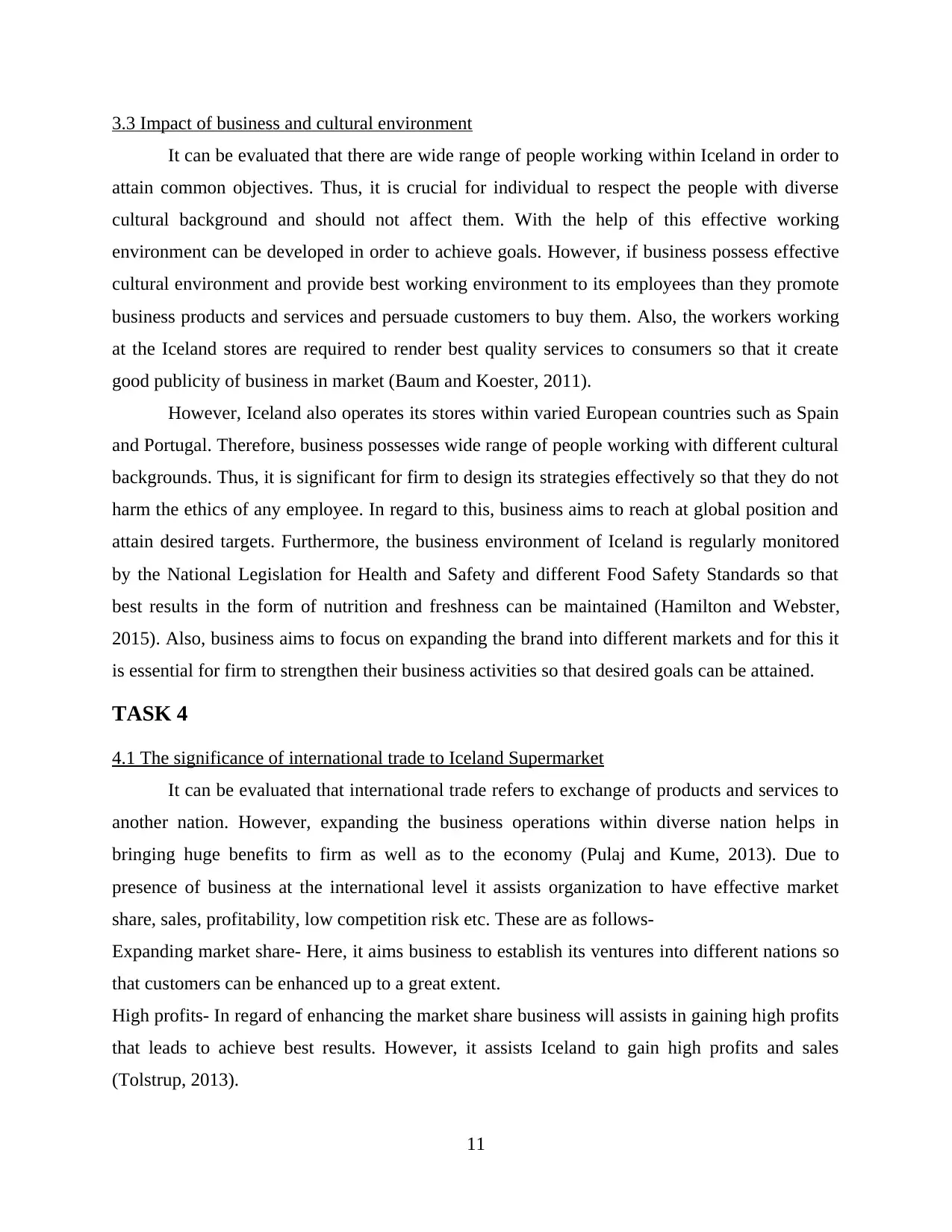
3.3 Impact of business and cultural environment
It can be evaluated that there are wide range of people working within Iceland in order to
attain common objectives. Thus, it is crucial for individual to respect the people with diverse
cultural background and should not affect them. With the help of this effective working
environment can be developed in order to achieve goals. However, if business possess effective
cultural environment and provide best working environment to its employees than they promote
business products and services and persuade customers to buy them. Also, the workers working
at the Iceland stores are required to render best quality services to consumers so that it create
good publicity of business in market (Baum and Koester, 2011).
However, Iceland also operates its stores within varied European countries such as Spain
and Portugal. Therefore, business possesses wide range of people working with different cultural
backgrounds. Thus, it is significant for firm to design its strategies effectively so that they do not
harm the ethics of any employee. In regard to this, business aims to reach at global position and
attain desired targets. Furthermore, the business environment of Iceland is regularly monitored
by the National Legislation for Health and Safety and different Food Safety Standards so that
best results in the form of nutrition and freshness can be maintained (Hamilton and Webster,
2015). Also, business aims to focus on expanding the brand into different markets and for this it
is essential for firm to strengthen their business activities so that desired goals can be attained.
TASK 4
4.1 The significance of international trade to Iceland Supermarket
It can be evaluated that international trade refers to exchange of products and services to
another nation. However, expanding the business operations within diverse nation helps in
bringing huge benefits to firm as well as to the economy (Pulaj and Kume, 2013). Due to
presence of business at the international level it assists organization to have effective market
share, sales, profitability, low competition risk etc. These are as follows-
Expanding market share- Here, it aims business to establish its ventures into different nations so
that customers can be enhanced up to a great extent.
High profits- In regard of enhancing the market share business will assists in gaining high profits
that leads to achieve best results. However, it assists Iceland to gain high profits and sales
(Tolstrup, 2013).
11
It can be evaluated that there are wide range of people working within Iceland in order to
attain common objectives. Thus, it is crucial for individual to respect the people with diverse
cultural background and should not affect them. With the help of this effective working
environment can be developed in order to achieve goals. However, if business possess effective
cultural environment and provide best working environment to its employees than they promote
business products and services and persuade customers to buy them. Also, the workers working
at the Iceland stores are required to render best quality services to consumers so that it create
good publicity of business in market (Baum and Koester, 2011).
However, Iceland also operates its stores within varied European countries such as Spain
and Portugal. Therefore, business possesses wide range of people working with different cultural
backgrounds. Thus, it is significant for firm to design its strategies effectively so that they do not
harm the ethics of any employee. In regard to this, business aims to reach at global position and
attain desired targets. Furthermore, the business environment of Iceland is regularly monitored
by the National Legislation for Health and Safety and different Food Safety Standards so that
best results in the form of nutrition and freshness can be maintained (Hamilton and Webster,
2015). Also, business aims to focus on expanding the brand into different markets and for this it
is essential for firm to strengthen their business activities so that desired goals can be attained.
TASK 4
4.1 The significance of international trade to Iceland Supermarket
It can be evaluated that international trade refers to exchange of products and services to
another nation. However, expanding the business operations within diverse nation helps in
bringing huge benefits to firm as well as to the economy (Pulaj and Kume, 2013). Due to
presence of business at the international level it assists organization to have effective market
share, sales, profitability, low competition risk etc. These are as follows-
Expanding market share- Here, it aims business to establish its ventures into different nations so
that customers can be enhanced up to a great extent.
High profits- In regard of enhancing the market share business will assists in gaining high profits
that leads to achieve best results. However, it assists Iceland to gain high profits and sales
(Tolstrup, 2013).
11
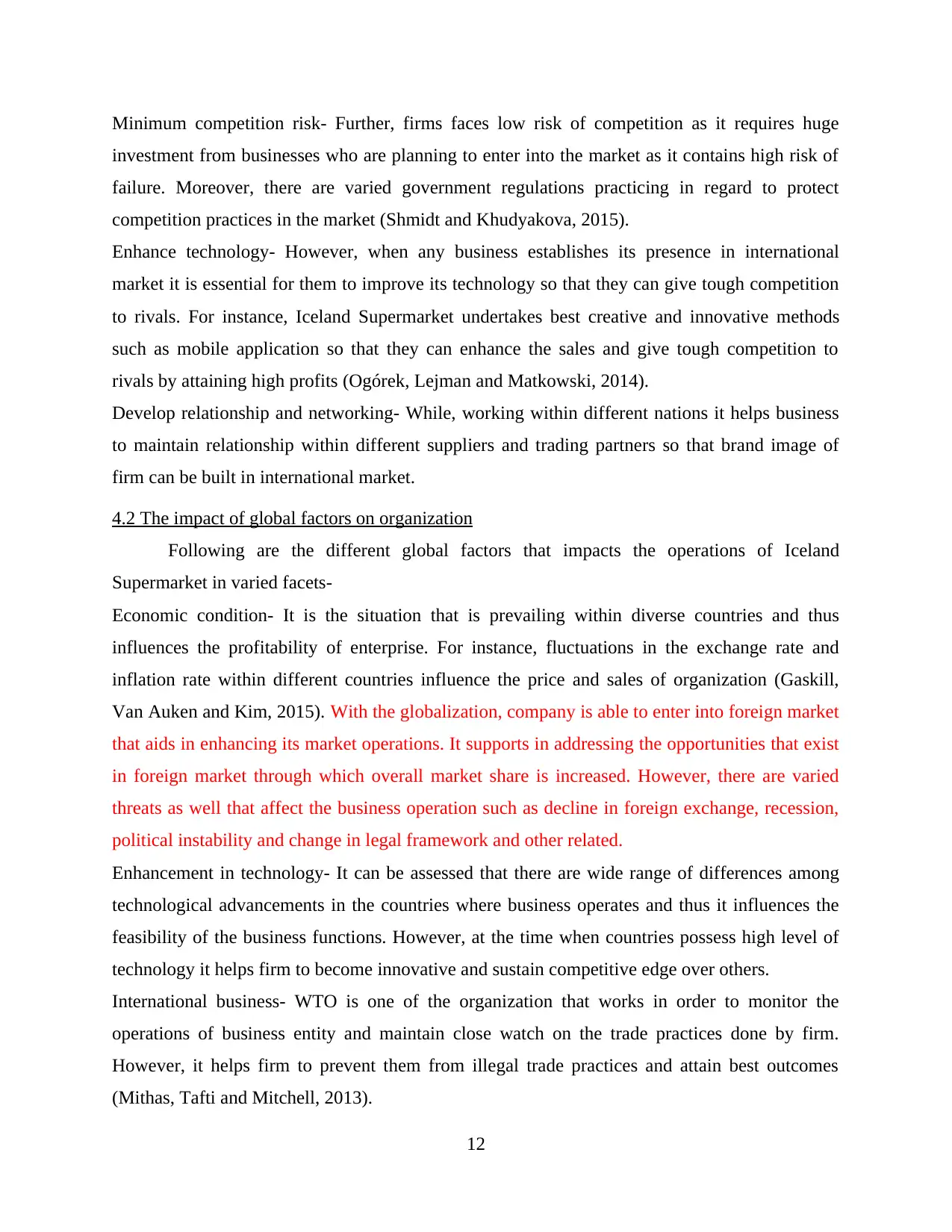
Minimum competition risk- Further, firms faces low risk of competition as it requires huge
investment from businesses who are planning to enter into the market as it contains high risk of
failure. Moreover, there are varied government regulations practicing in regard to protect
competition practices in the market (Shmidt and Khudyakova, 2015).
Enhance technology- However, when any business establishes its presence in international
market it is essential for them to improve its technology so that they can give tough competition
to rivals. For instance, Iceland Supermarket undertakes best creative and innovative methods
such as mobile application so that they can enhance the sales and give tough competition to
rivals by attaining high profits (Ogórek, Lejman and Matkowski, 2014).
Develop relationship and networking- While, working within different nations it helps business
to maintain relationship within different suppliers and trading partners so that brand image of
firm can be built in international market.
4.2 The impact of global factors on organization
Following are the different global factors that impacts the operations of Iceland
Supermarket in varied facets-
Economic condition- It is the situation that is prevailing within diverse countries and thus
influences the profitability of enterprise. For instance, fluctuations in the exchange rate and
inflation rate within different countries influence the price and sales of organization (Gaskill,
Van Auken and Kim, 2015). With the globalization, company is able to enter into foreign market
that aids in enhancing its market operations. It supports in addressing the opportunities that exist
in foreign market through which overall market share is increased. However, there are varied
threats as well that affect the business operation such as decline in foreign exchange, recession,
political instability and change in legal framework and other related.
Enhancement in technology- It can be assessed that there are wide range of differences among
technological advancements in the countries where business operates and thus it influences the
feasibility of the business functions. However, at the time when countries possess high level of
technology it helps firm to become innovative and sustain competitive edge over others.
International business- WTO is one of the organization that works in order to monitor the
operations of business entity and maintain close watch on the trade practices done by firm.
However, it helps firm to prevent them from illegal trade practices and attain best outcomes
(Mithas, Tafti and Mitchell, 2013).
12
investment from businesses who are planning to enter into the market as it contains high risk of
failure. Moreover, there are varied government regulations practicing in regard to protect
competition practices in the market (Shmidt and Khudyakova, 2015).
Enhance technology- However, when any business establishes its presence in international
market it is essential for them to improve its technology so that they can give tough competition
to rivals. For instance, Iceland Supermarket undertakes best creative and innovative methods
such as mobile application so that they can enhance the sales and give tough competition to
rivals by attaining high profits (Ogórek, Lejman and Matkowski, 2014).
Develop relationship and networking- While, working within different nations it helps business
to maintain relationship within different suppliers and trading partners so that brand image of
firm can be built in international market.
4.2 The impact of global factors on organization
Following are the different global factors that impacts the operations of Iceland
Supermarket in varied facets-
Economic condition- It is the situation that is prevailing within diverse countries and thus
influences the profitability of enterprise. For instance, fluctuations in the exchange rate and
inflation rate within different countries influence the price and sales of organization (Gaskill,
Van Auken and Kim, 2015). With the globalization, company is able to enter into foreign market
that aids in enhancing its market operations. It supports in addressing the opportunities that exist
in foreign market through which overall market share is increased. However, there are varied
threats as well that affect the business operation such as decline in foreign exchange, recession,
political instability and change in legal framework and other related.
Enhancement in technology- It can be assessed that there are wide range of differences among
technological advancements in the countries where business operates and thus it influences the
feasibility of the business functions. However, at the time when countries possess high level of
technology it helps firm to become innovative and sustain competitive edge over others.
International business- WTO is one of the organization that works in order to monitor the
operations of business entity and maintain close watch on the trade practices done by firm.
However, it helps firm to prevent them from illegal trade practices and attain best outcomes
(Mithas, Tafti and Mitchell, 2013).
12
⊘ This is a preview!⊘
Do you want full access?
Subscribe today to unlock all pages.

Trusted by 1+ million students worldwide
1 out of 16
Related Documents
Your All-in-One AI-Powered Toolkit for Academic Success.
+13062052269
info@desklib.com
Available 24*7 on WhatsApp / Email
![[object Object]](/_next/static/media/star-bottom.7253800d.svg)
Unlock your academic potential
Copyright © 2020–2026 A2Z Services. All Rights Reserved. Developed and managed by ZUCOL.





